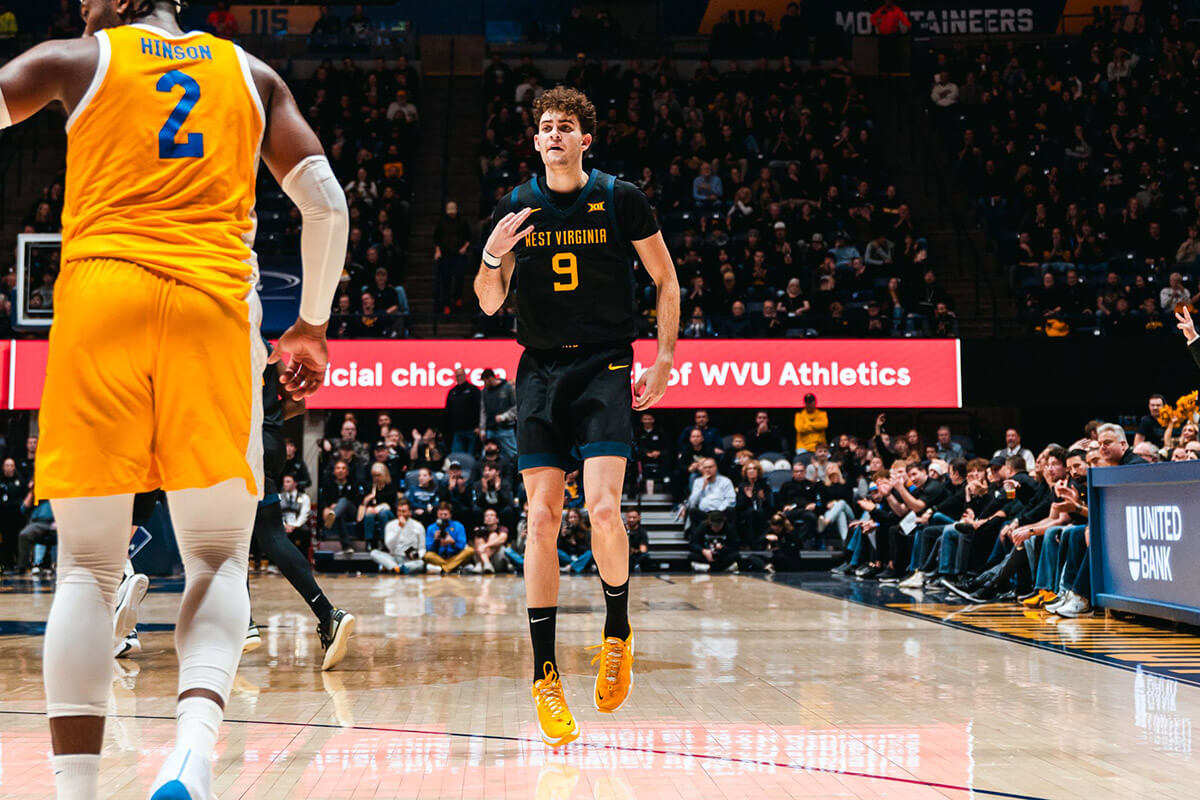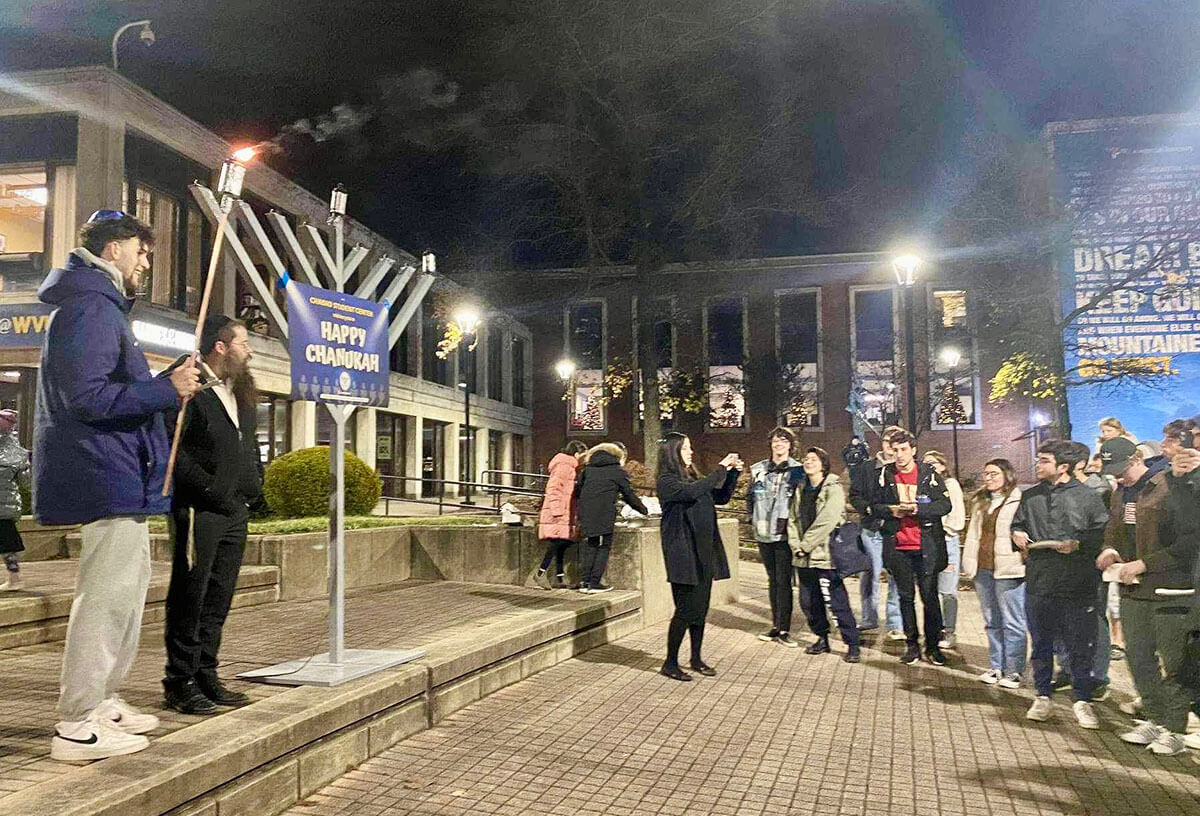‘Really different from Tel Aviv’: Meet the Israeli last-minute addition to West Virginia University’s basketball team
As war rages back home, Ofri Naveh is trying to make an impact — both on and off the court

Graphic by Angelie Zaslavsky
MORGANTOWN, W.Va. — Flip on ESPN to watch a basketball game at West Virginia University, and you’ll spot something you might not have expected. Directly behind the TV announcers, in the front row of the student section: an Israeli flag.
The fans are showing their support for Israeli Ofri Naveh, a freshman forward, who moved to the United States this summer. That support became more meaningful after Oct. 7, when Hamas terrorists massacred more than 1,200 Israelis, and kidnapped hundreds of others.
“I lost friends,” Naveh, 18, told me as we sat in the bleachers of a nearly empty WVU Coliseum after practice on a recent afternoon. “Some of my friends lost their whole family.”
He talks every day with his family back home, where they live in northern Israel, relatively safe from the violence in Gaza. “I know I have to be strong for them, so they don’t have to worry about me, too.”
Naveh is trying to do as much as he can from the U.S. to help with the war effort: posting to his social media platforms to raise awareness about the tragedies happening in Israel and using his status as big man on campus (quite literally, he’s 6’6”) where he showcases his Judaism with pride. On Thursday, the first night of Hanukkah, he helped light a public outdoor menorah on campus.
“He’s the tallest Jew on campus, so he had to light the menorah,” joked Rabbi Zalman Gurewitz, who runs WVU’s Rohr Chabad Jewish Center. “It’s always heartwarming to see when students are confident and proud of their Jewish identity.”
That pride means even more when that Jewish student is well known, and at a time when many Jews are feeling cautious, the rabbi continued. Naveh, Gurewitz said, “gives a boost to other Jewish students.”

Panera and shawarma
Naveh was not supposed to be here.
When West Virginia University’s longtime head coach, Bob Huggins, resigned suddenly this summer, several players left as well. The team needed players. And they needed them fast.
They had heard about Naveh, who played on the under-18 team for Maccabi Tel Aviv and represented Israel at this summer’s European championship. The coaches hopped on a Zoom call with Naveh and offered him a spot. He arrived on campus two days before school started.
In this season’s opening games, three of WVU’s players were out for medical reasons or due to ineligibility, allowing Naveh to play more than the typical newcomer. He’s averaging more than 27 minutes per game.
Like most players in Israel, Naveh, who weighs 185 pounds, is scrawny compared to the more muscled men playing in the NCAA’s Big 12 league, in which WVU competes. He’s gained 16 pounds since he arrived on campus in August, from a combination of weightlifting and, he admits, going to Panera. “I eat everything,” he said, adding that he still can’t find a good shawarma in West Virginia.
What he currently lacks in size, he makes up for by being cerebral. He sees the entire floor and strategizes. Often after WVU scores, ESPN announcers will point out that it was Naveh who orchestrated the assist.
“Ofri is so self-confident in his ability,” said Jordan McCabe, a former WVU player who is now on the team’s coaching staff. “He’s extremely disciplined, extremely hard working. He’s probably logged as many hours in the gym as any of our guys, if not more.”
An Israeli at ease
Off the court, Naveh is enjoying the change in scenery. WVU is nestled in the rolling hills of the Appalachian Mountains. “Morgantown is really different from Tel Aviv,” he said with a smile. “I prefer the quiet stuff, not the big city. And I’m a nature guy and happy to wake up to snow.”
Compared to what’s happening at many of the country’s more elite schools, West Virginia University has seen little, if any, anti-Israel rhetoric on campus. Naveh said he has not experienced any antisemitism, and has been warmly welcomed by the student body.
He’s majoring in business and hopes to one day play in the NBA, following in the footsteps of Deni Avdija, the Washington Wizards starter and the only Israeli player currently in the league.
For the time being, Naveh is just grateful for the opportunity to play college basketball. “I’m trying to make the most out of it,” he said.
And, with that, he bolted up from the bleachers and ran down to the court. Most everyone had already left. But Naveh picked up a ball and began shooting.















